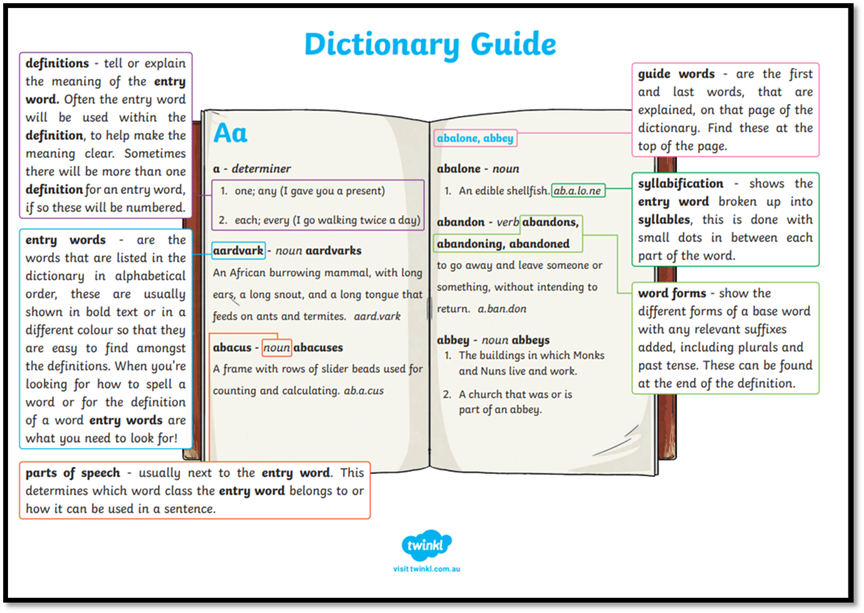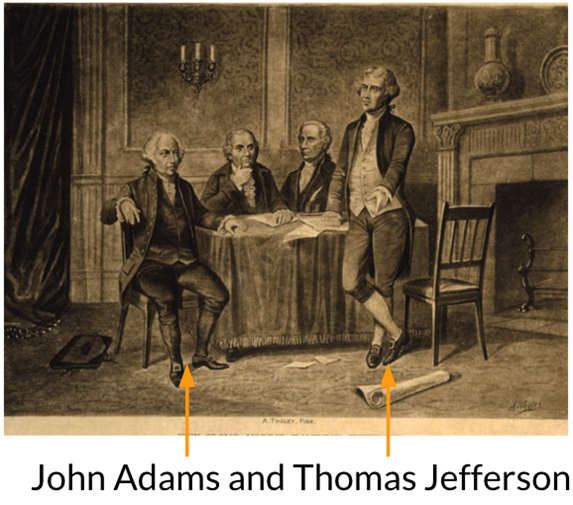Finding the Best Evidence with "Two Famous Friends"
Unit Overview
The
learning objective for this lesson is for you to develop the skills necessary
to find evidence in an informational text, enhance your dictionary skills, and
understand the proper use of modifiers. By the end of this lesson, you will be
able to identify key details and supporting evidence within a text, effectively
use a dictionary to define unfamiliar words, and correctly employ modifiers to
enhance your writing by adding clarity and precision. Through guided practice
and interactive activities, students will strengthen their critical reading
skills, expand their vocabulary, and refine their writing style to communicate
their ideas with appropriate evidence and descriptive language effectively.
Finding Evidence
It is
essential to support our ideas with strong evidence. This not only enhances the
credibility of our arguments but also helps us develop critical thinking
skills. This section will explore five types of evidence that can effectively
support our ideas.
1. Statistical Data:
Statistics provide concrete numbers and facts reinforcing our arguments. For
instance, discussing the benefits of physical exercise, we can cite research
showing how regular exercise improves academic performance. We can demonstrate
the correlation between physical activity and improved grades using statistical
data.
2. Expert Opinions: Experts
in a particular field possess extensive knowledge and experience, making their
opinions highly valuable. Quoting experts can add weight to our arguments. For
example, if we debate the importance of renewable energy sources, we can
include quotes from renowned scientists specializing in the field. Expert
opinions help us establish credibility and show knowledgeable individuals
support our ideas.
3. Personal Anecdotes: Personal
anecdotes provide a unique perspective and can make our ideas relatable.
Sharing personal experiences helps create a connection with the audience and
adds an emotional element to our arguments. For instance, when discussing the
importance of mental health awareness, we can share a personal story of
overcoming challenges and how seeking help positively impacts our lives.
Personal anecdotes make our ideas more memorable and engaging.
4. Case Studies: Case
studies involve in-depth analysis of real-life situations. They comprehensively
understand a subject and offer concrete evidence to support our ideas. For
example, when discussing the impact of climate change, we can present a case
study on a specific region affected by rising sea levels and how it has led to
displacement and loss of livelihood. Case studies help us delve into the
details and present a compelling argument.
5. Research Findings: Research
findings result from extensive studies conducted by professionals in various
fields. They offer empirical evidence that can support our ideas. For instance,
if we are discussing the effects of technology on sleep patterns, we can cite
research studies that demonstrate how excessive screen time before bed disrupts
sleep quality. Research findings provide reliable evidence that can strengthen
our arguments.
Supporting
our ideas with the best evidence is crucial. By utilizing statistical data,
expert opinions, personal anecdotes, case studies, and research findings, we
can present well-rounded arguments that are persuasive and compelling arguments.
Remember, evidence is the backbone of any argument, so choose the most relevant
and credible sources to support your ideas.
Letís Practice
Dictionary Skills
Dictionary
skills are essential for students to enhance their language proficiency and overall
academic performance. Navigating through a dictionary effectively can assist you
in expanding your vocabulary, developing your reading comprehension, and gaining
a deeper understanding of the English language. This section will explore the
importance of dictionary skills and some useful tips to enhance your dictionary
skills.
1. Understanding Dictionary Entries: Dictionary entries are structured to provide comprehensive
information about a word. Each entry typically includes the word's spelling, pronunciation,
definition(s), example sentences, and part(s) of speech. Familiarizing yourself
with these components will ensure you can extract the maximum information from
each entry, enabling a better understanding of the word's usage and meaning.
2. Using Guide Words: Guide
words, usually found at the top of each dictionary page, act as navigational
aids to help locate specific words quickly. These words represent the first and
last entries on the page and are essential for efficient dictionary usage. Understanding
how to guide words work, you can quickly locate the desired word, saving
valuable time during research or when looking up unfamiliar terms.
3. Exploring Synonyms and Antonyms: Dictionaries provide synonyms and antonyms for many words.
Synonyms have similar meanings to the defined word, allowing students to expand
their vocabulary and make their writing more diverse and engaging. On the other
hand, Antonyms offer words with opposite meanings, helping you understand the concept
of contrast and improving your understanding of language nuances.
4. Decoding Pronunciations:
Dictionaries provide phonetic symbols that represent the pronunciation of a
word. Understanding these symbols will enable you to correctly pronounce words
they encounter for the first time. By breaking down complex words into
syllables and using the provided pronunciation guide, you can build confidence
in their oral communication skills and avoid common pronunciation errors.
5. Utilizing Example Sentences: Example sentences in dictionaries provide context for word
usage. By studying these sentences, you can understand how words are used in
different contexts, correctly use them, and expand your understanding of grammar.
Analyzing examples and sentences can also enhance reading comprehension skills
and enable students to apply new words in their writing effectively.

Mastering
dictionary skills is crucial as it enhances your language proficiency, expands
vocabulary, and improves reading comprehension. By understanding the structure
of dictionary entries, utilizing guide words, exploring synonyms and antonyms,
decoding pronunciations, and utilizing example sentences, you can unlock the
power of words and become more confident in your language abilities. Regular
practice and application of these skills will undoubtedly lead to academic
success and effective communication in the future.
Letís Practice
Modifiers
Modifiers
are an essential part of the English language that can greatly impact the
clarity and effectiveness of your writing. In this section, we will explore the
different types of modifiers and how to use them correctly. By understanding
modifiers, you can express yourself more accurately and vividly in your
writing.
Types of Modifiers:
1. Adjectives: Adjectives are words that describe or modify nouns or
pronouns. They provide additional information about the size, shape, color, or
qualities of the noun they modify. For example, in the sentence "The
beautiful flowers bloomed in the garden," the word "beautiful"
is an adjective that modifies the noun "flowers."
2. Adverbs: Adverbs are words that modify verbs, adjectives, or other
adverbs. They provide information about how, when, where, or to what extent
something happens. For example, in the sentence "She ran quickly to catch
the bus," the word "quickly" is an adverb that modifies the verb
"ran."
3. Phrases: Modifying phrases are groups of words that act as adjectives or
adverbs. They provide additional details about nouns, verbs, adjectives, or
adverbs. For example, in the sentence "The girl with curly hair won the
race," the phrase "with curly hair" modifies the noun "girl."
4. Clauses: Modifying clauses are groups of words that contain a subject
and a verb. They can act as adjectives or adverbs, providing additional
information about nouns, verbs, adjectives, or adverbs. For example, in the
sentence "The book that she borrowed from the library was very
informative," the clause "that she borrowed from the library"
modifies the noun "book."
Understanding
modifiers is crucial for effective communication and writing. By using
modifiers correctly, you can add depth and clarity to your sentences. Take the
time to practice using different modifiers, and soon you'll notice a
significant improvement in your writing skills.
Letís Practice
"Two Famous Friends" by Jean K. Potratz

You will
have two ways to read and complete the activities.†
1. Click here to get a download copy of the reading activity.
2. Click here to sign up for an online version of the reading activity
through CommonLit. (Code: F6SRJ9UF)
The target
lesson will have five parts.
∑
Part 1 - Warm-Up: Writing
∑
Part 2 - Video Introducing the Target Skill: Finding the Best
Evidence
∑
Part 3 - Review the Target Skill
∑
Part 4 - Reading and Answering Questions
∑
Part 5 - Assessment